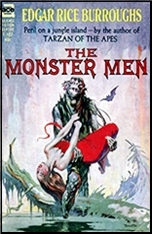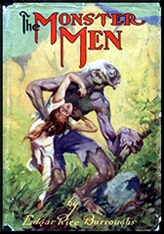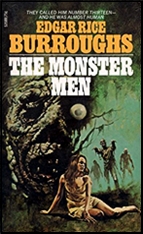Mon 29 Oct 2018
A Book Review for Halloween by Dan Stumpf: EDGAR RICE BURROUGHS – The Monster Men.
Posted by Steve under Reviews , Science Fiction & Fantasy[5] Comments

EDGAR RICE BURROUGHS – The Monster Men. Ace #F-182, paperback, 1963. Cover by Frank Frazetta. First published by A. C. McClurg & Co., hardcover, March 1929. Cover by J. Allen St. John. Several other reprint editions exist.
I was maybe 14 years old when I read a review of this book in Castle of Frankenstein magazine. I had a dollar at the time, so I got on the bus and went downtown to a place called the Paperback Gallery, a little bookstore that sold only paperbacks.
It was there I picked up my first samples of Fu Manchu, Doc Savage, Mr Moto, Charlie Chan, the first EC reprints….. and got a copy of this. Came back home with enough left over for two chocolate bars, and had a high old time with it.
And there it was, still on my shelf after all these years & tears & fears, just in time for Halloween.

Reading The Monster Men in the wisdom of my advancing years, I found myself bemused by ERB’s awful prose and delighted by the pace he imparts to the story. Never mind Characterization; that don’t enter into it. It’s set on a tropical island in the South Seas, off Java and Borneo, and I wondered idly if Conrad’s Marlow might cruise by, or perhaps Somerset Maugham in search of a tale of human interest. But (SPOILER ALERT!) they didn’t.
What does happen owes more than a nod to H.G. Wells’ Island of Dr Moreau, with an unhinged scientist, his lovely daughter and a small entourage on a tropical island where he can conduct his experiments in creating Men in relative privacy.

Unfortunately, the mad medico’s first twelve attempts have produced only shambling monsters (hence the title of the piece) and the failures have addled him to the point where he vows to wed his daughter to Number Thirteen -– which, to everyone’s surprise, emerges from the vat looking like a Greek statue with a becoming tan.
At which point the plot kicks into high gear, with a pirate attack, treachery within the ranks, head-hunters, a Monster rally, daring rescues, pitched battles and over it all, Number Thirteen, now known as Bulan, braving the jungle perils as one to the manner born.
I should be ashamed to admit how much I enjoyed this. Burrough’s prose is so bad I sometimes suspect him of parody, but he keeps it moving without too much of the padding that marred the Tarzan books I tried to read back in the day. The story did eventually get to where most Burroughs books go: Everyone chasing each other around in the jungle, but in this one it seems a bit less protracted.

Burroughs even surprised me with a bit of insight on the nature of the Soul here. He reflects a mind-set common in SF early in the 20th century, when artificial insemination was first used on animals, that a man-made creature would have no soul — an idea that surfaced in Alraune and elsewhere.
Here, Bulan ponders his artificial origins and essential soullessness, then looks about him at the men he has encountered — pirates, thieves, and his mad creator — only to conclude that the Soul must be worth much less than the value men seem to attach to it.
And this, oddly enough, is the kind of thing one does find in the tales of Conrad and Maugham in those same South Seas of fiction. Maybe not enough to elevate The Monster Men to the ranks of Great Literature, but it adds a bit of thoughtfulness to a ripping yarn.
October 29th, 2018 at 10:50 pm
Dan, I still have my hardcover copy of THE MONSTER MEN that I read as a 10 year old. I don’t remember anything about it but since I also like the South Seas fiction of Joseph Conrad and Somerset Maugham, maybe I can dig it out and put it on my TBR pile (which now fills an entire room).
October 30th, 2018 at 7:38 am
. . . And I first read it off the paperback rack in that 40¢ Ace edition, with the Frazetta cover, more years ago than I like to remember. Here you have a Philip K Dick conundrum — can you be “human” if you were synthetically created? — along with the extra goodies of headhunters, jungle hero, and Malay pirates that Dan mentions. And orangutans. Don’t forget the orangutans. There’s a really weird scene where the misshapen monster men discover a community of orangutans, get the hots for the females, and try to carry them off like the Sabine women.
October 30th, 2018 at 10:52 am
I had a fairly complete collection of Burroughs once and I read every one, including this which I had in the Ace paperback. I mentioned reading my way through all of Burroughs to Gordon Huber who told me that while he collected Burroughs he didn’t read him. What’s the point of having something without reading it I thought?
October 30th, 2018 at 10:57 am
I agree, Randy, but I’m a reader too. Collectors have different ideas sometimes as to what they collect. The covers of the Burroughs books, for example, makes them nice objects to have and to hold in your hand and to look at. I don’t know if that applies to Gordon, though!
October 30th, 2018 at 4:52 pm
Richard Lupoff wrote an interesting synopsis of this one in ERB MASTER OF ADVENTURE, which was enough to get it on my list of Burrough’s non series books to read.
I found it a great deal of fun and rereading it years later did so again. It was written in what I call Burrough’s “awkward” period when he was transitioning from the Victorian/Edwardian voice he began with in the John Carter and early Tarzan novels to his later more modern prose, so what keeps this one moving are his natural gifts as a storyteller (or pot boiler if you prefer) and his eye for a good set piece.
The plot has just enough twists, coincidences, goofiness, and charm to be ERB near his best, and as Dan points out you are almost always surprised when ERB turns out to be a fairly cranky and interesting fellow, an atheist, a bit of a satirist, and as much cynic as romaticist. One of his strength’s is that he isn’t a sentimentalist or a traditionalist and his heroes for all their Victorian morality are more comfortable hanging out with rogues, barbarians, and animals than annoying civilized types.
Those things get the reader past many of his flaws in his best books, that and he seemed to have a direct line to the psyche of fourteen year old boys of all ages.